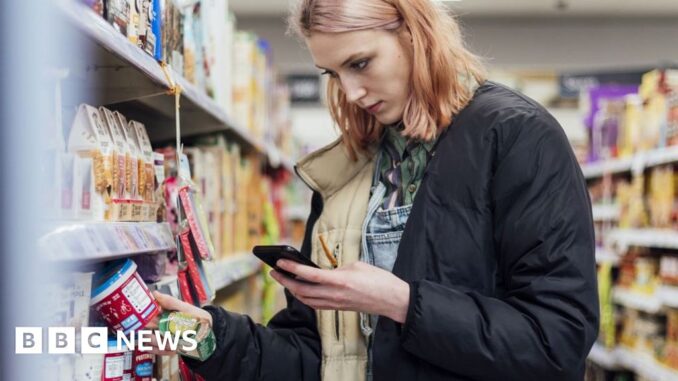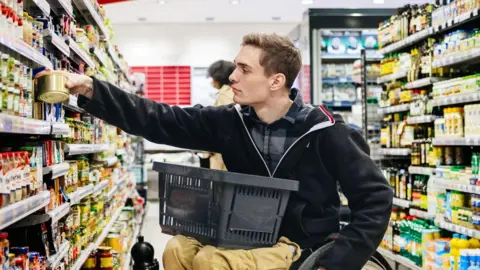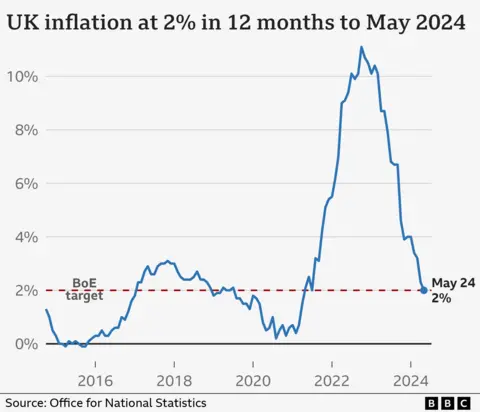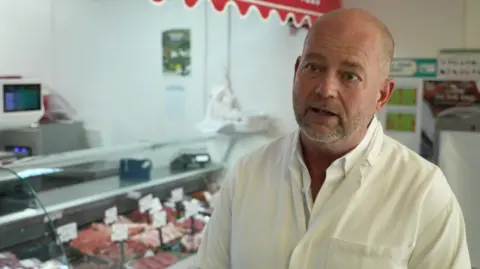
 Getty Images
Getty ImagesInflation has hit the Bank of England’s target for the first time in almost three years.
Prices rose at 2% in the year to May, down from 2.3% the month before, official figures show.
The economy is a key talking point in the run-up to the general election on 4 July, with all of the main parties debating how they would keep the cost of living under control.
It comes ahead of a Bank of England decision on UK interest rates this Thursday.
The bank is expected to hold the rate at 5.25% – the highest for 16 years – for the seventh meeting in a row, with markets not betting on a cut until August.
The drop in May’s figure was driven by a slowdown in price rises for food and soft drinks, recreation and culture, and furniture and household goods.
However, petrol prices went up sharply.
Inflation hit 11.1% – its highest level in over 40 years – in October 2022 as energy and food prices surged due to Russia’s invasion of Ukraine.
It sparked a cost of living crisis, leaving millions of households struggling to pay for basics.
Inflation has been steadily falling since then but it does not mean the prices of goods and services overall are coming down, just that they are rising at a slower pace.
The Bank of England has also put up interest rates to dampen down consumer demand, driving up mortgage costs for homeowners across the UK in the process.

‘Pressures on family finances are still acute’
May’s figures are the last big official economic statistics before the general election campaign and will spark significant debate among the main parties.
The Conservatives will hope the figures can help their story of an economic turnaround.
But Labour continue to press concerns about an ongoing cost of living crisis.
Food prices are still 25% higher than at the beginning of 2022 and petrol prices are now on the way up again.
Chancellor Jeremy Hunt said May’s figure showed that “the difficult decisions that we’ve taken have paid off”.
“That would not have happened under Labour that refused to condemn the public sector pay strikes, that would have meant inflationary pay rises, inflation lasting longer,” he added.
But Rachel Reeves, Labour’s shadow chancellor, said: “Unlike Conservative ministers, I’m not going to claim that everything is all fine, that the cost of living crisis is over, because I know that pressures on family finances are still acute”.
Liberal Democrat Treasury spokeswoman Sarah Olney said: “The hard truth is that millions of people won’t be feeling any better off today, thanks to years of Conservative economic mismanagement.
“Rishi Sunak’s boasts will ring hollow to countless families seeing their mortgages skyrocket and agonising rises in shopping prices compared to just a few years ago.”
‘You can’t pass all costs on to customers’

Gary Wildman, the owner of John Wildman & Sons butchers, told the BBC he had seen price rises levelling out at the store he started with his dad 31 years ago in Rusington, West Sussex.
“Prices are probably 10 to 15% more than they were at the beginning of Covid, but they are level now, definitely,” he told the BBC.
However, he said some products such as pork were still going up while the shop’s energy bills were higher than a few years ago.
“You do take a hit to your margins,” he said. “You can’t pass all costs on to customers or the customers wouldn’t come in.”
UK inflation is now rising at its slowest pace since July 2021.
It is also lower than in the eurozone and the US, where rates in May were 2.6% and 3.3% respectively.
However, the UK is not out of the woods yet, with price rises in the services sector still high.
James Smith, research director at the Resolution Foundation think tank, which campaigns for better living standards for low-to-middle income families, said families “continue to struggle with the higher cost of essentials”.
“And while headline inflation is back to normal levels, domestically-driven services-price inflation remains elevated. This inflation will worry the Bank of England, and may give pause for thought when it comes to cutting interest rates.”



Be the first to comment